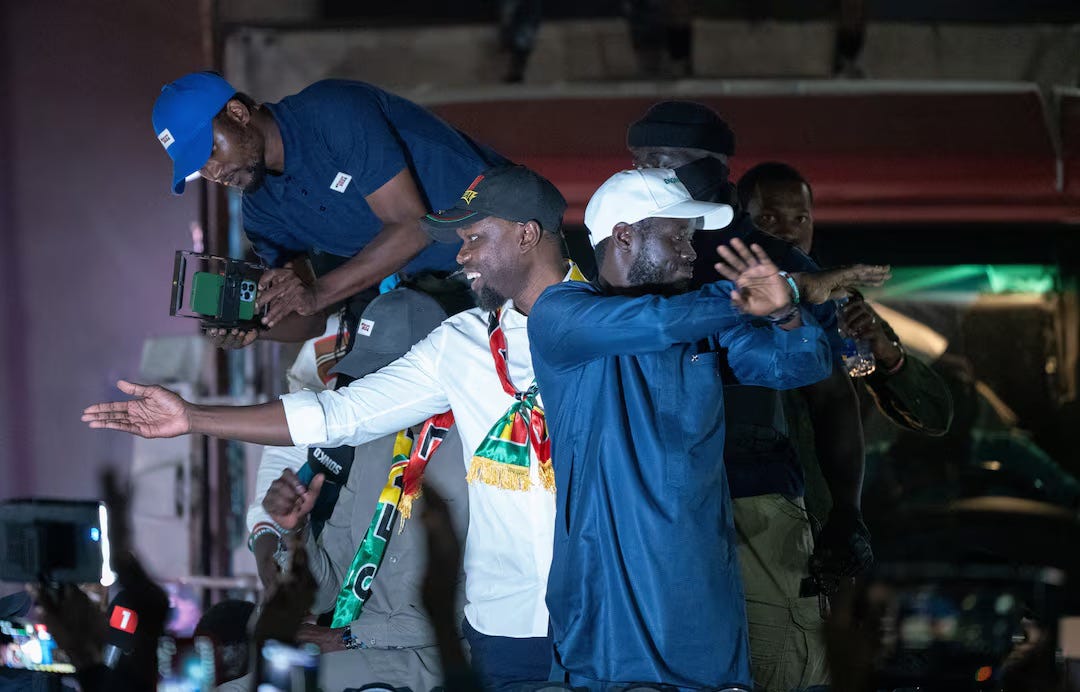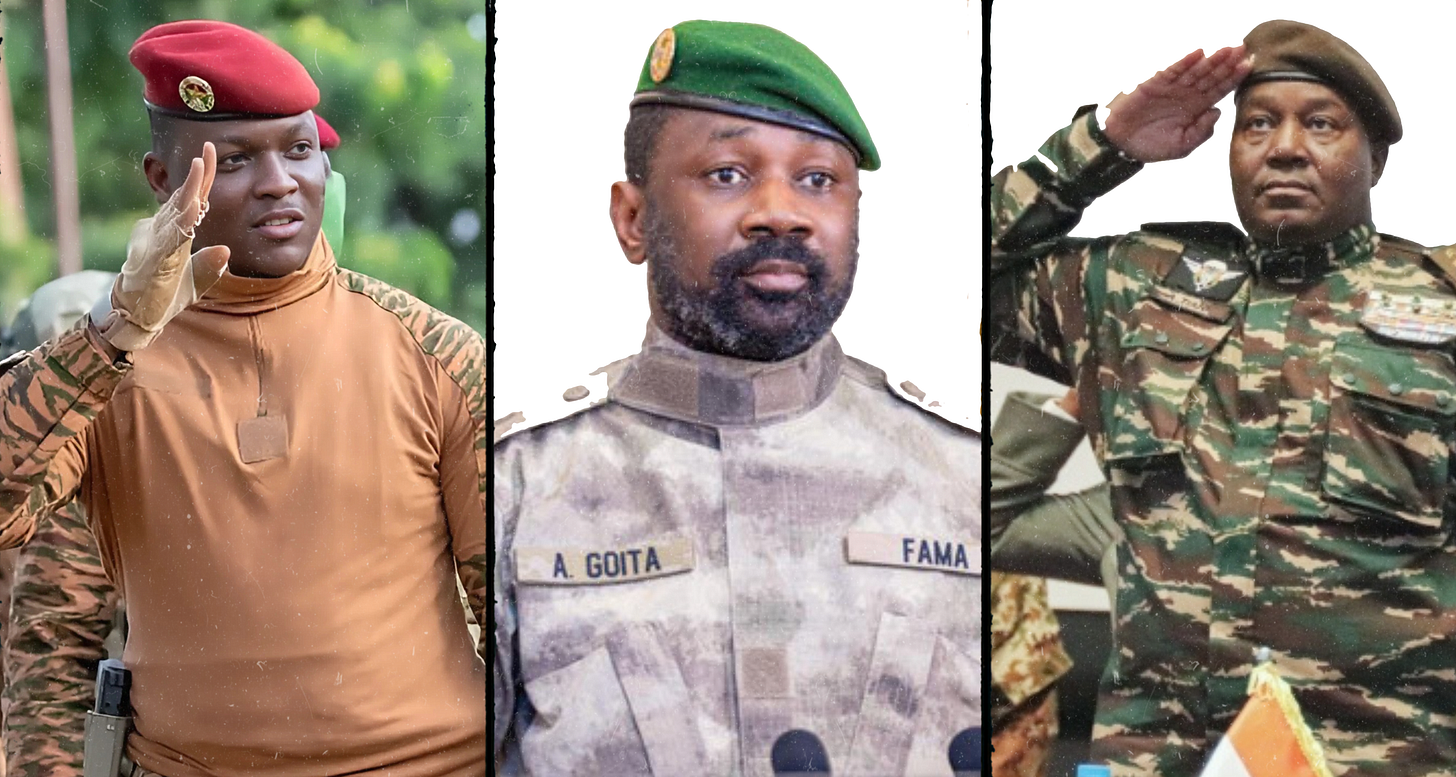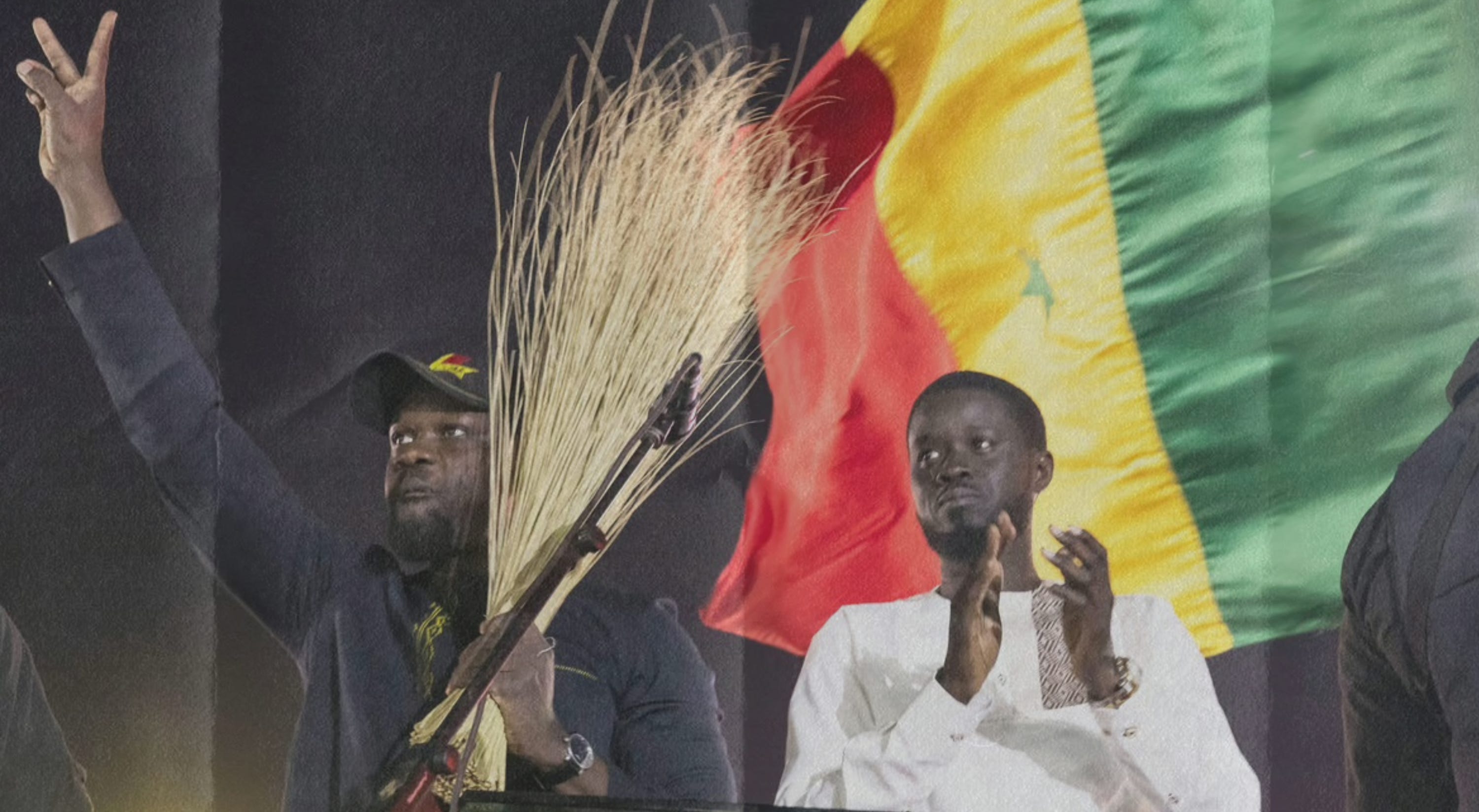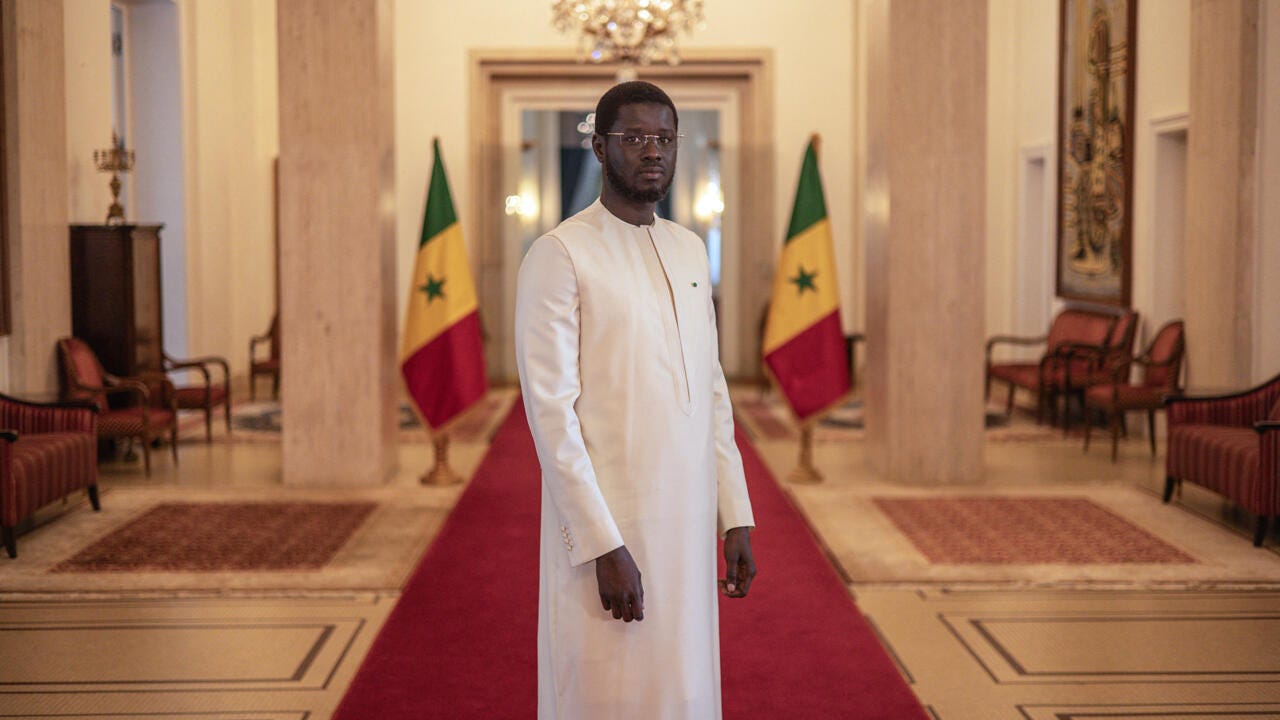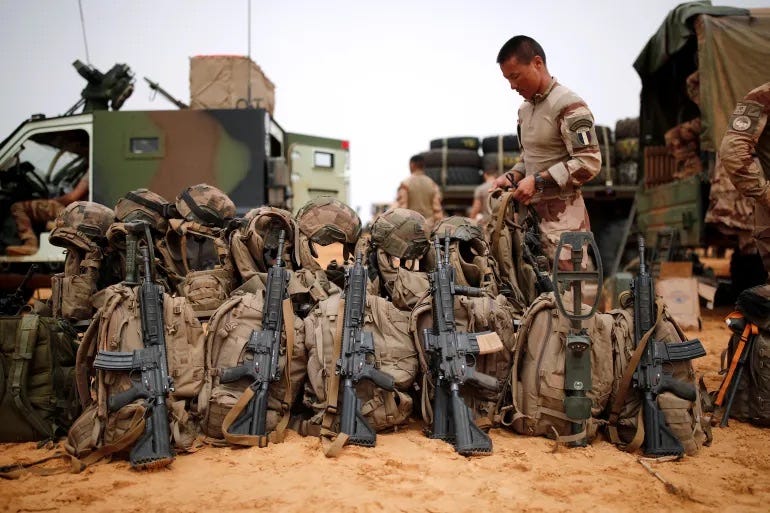Senegal's Faye and Sonko: The Political Duo to Watch in 2025
The tandem pulled the biggest electoral upset last April, and if they are to be remembered as truly transformative, the new year will be very decisive. But Faye and Sonko appear to be unfazed.
Personality of the Year
The factors of the current awakening in West Africa are not easy to place. Sure, an ageing political class with a timid conception of African sovereignty has slowly been on the wane, bowing out.
Sure, the children born in the 1990s when Africa was told at the Baule Conference that democracy must be its future are now grown. Both must count for something. But the upheavals that have led to this moment didn’t happen overnight.
Fifteen years ago, the children of the great democratic promise noted with disappointment that the golden anniversary of the Continent’s ascent to independence was a hollow event. Africa seemed to have walked backward in those 50 years it had supposedly been free from European colonial powers.
In the face of political corruption and electoral violence and economic fraud; in the face of growing poverty, of the recurrent and dismal spectacles of African migrants drowning at sea in their attempt to flee to Europe, the children of the great democratic promise of the 90s knew something had to change.
The decade that would follow the golden independence jubilee would be marked by intense political activism. It was led by rap and reggae artists, by firebrands both of the civil society and opposition parties. There were rowdy riots; there were scenes of police gassing protesters.
During that decade, you would be hard-pressed to crown a Personality of the Year from the ruling class. But fast forward to the last three years, when the thirst for actual change became too strong to contain.
Rising against their respective circumstances, impatient youths risked their lives to impose a new political order across several of the former French colonies in West Africa.
Either by the barracks or the ballots, the old political guards were railroaded into retirement. Africans have punched through the smokescreen of false independence. And back to first principles, they resolved to wade through chaos to secure true sovereignty—monetary, military, economic.
All is still in flux. But a look at the sheer political willingness of the new leadership in the region would deliver many choices for the crowning of a political champion.
We at the African Gazette have witnessed unusual patriotism across the region. Mali, Niger, Burkina Faso, Chad, etc: Picking a Political Personality of the Year wasn’t an ungrateful task in 2024. But who was it then for us?
Well, all the leaders of the embattled Federation of the state of the Sahel were rightful contenders. Yes, Ibrahim Traore of Burkina Faso, Assimi Goita of Mali, and Niger’s Abdourahamane Tchiani.
But they have been around for quite a while now—they were not revelations of the last year, unlike the tandem of Bassirou Faye and Ousmane Sonko.
And that’s the criterion on which the President and Prime Minister of Senegal are our political personalities of 2024. And you may agree with the reasons why.
Electoral Upset
The story of President Faye’s ascent to power will perhaps come to be told as a legend many years from now—the story of the man who went from the penitentiary to the presidency within a matter of one week.
And this is what makes it even more impressive: He had never held public office before, and had even lost a mayoral race in his native town a couple of years earlier. But President Faye will forever share the credit of his stunning electoral upset with his Prime Minister Ousmane Sonko.
As we reported at the time, Faye gained prominence as a close associate of Sonko, a former tax inspector and opposition leader who faced legal troubles.
Because of the said legal troubles, Sonko was barred from running in the presidential election. His party fielded Mr Faye as his stand-in. All that happened while they were behind bars.
Their imprisonment further fuelled a social unrest that had rumbled episodically for almost the previous four years. The anger and resentment towards the government were at an unprecedented height.
As the two lingered in prison, they were embraced by the electorate as symbols of resistance against injustice and corruption within the country's political elite.
Their popularity soared as disaffected civil servants and ordinary citizens considered them more than ever as the ultimate embodiment of hope.
Their campaign, funded largely by the Senegalese diaspora, garnered significant momentum and culminated in that landslide victory with 54 percent of the votes. And taking the oath of office, Bassirou declared:
“I’m aware that the results from the ballot express a deep desire for systemic change. Through my election, the Senegalese people have engaged in the construction of a just Senegal, a prosperous Senegal.”
In under a year, the new administration—against the doubts of naysayers, and despite some inevitable political faux pas—made sure to keep the hopes alive; in under a year, Faye and Sonko made sure they have something to show for their election.
Action, Action, Action
“Senegal is an independent country, it is a sovereign country, and sovereignty does not accommodate the presence of foreign military bases.”
—President Faye
Senegal’s ruling tandem has hit the ground running, as the President and the PM lost no time in getting to work. Change was the promise. It requires paperwork, and action. But in some cases, change happened by the very fact of the transition of power.
The tension across the country, the months of social unrest, dissipated immediately after Bassirou Faye took the oath of office.
Those internet blackouts, the political imprisonment, the repeated breach of free speech—all overnight—became the stuff of the past. And one direct positive fallout of this systemic improvement of the social atmosphere was a pick-up in tourism as the summer kicked in.
Then the executive decisions started rolling. The voters who went to the polls for change are told the government would operate in full transparency: ministers would actively account to the public for their actions; reports from the National Office Against Fraud and Corruption will be published for all to see.
As a result of this commitment to transparency, officials soon reported something that most Senegalese already suspected:
An inspection into the finances of the last administration uncovered widespread corruption. And because further investigations are pending, Macky Sall—the former President—and his ministers find themselves today worrying about the prospects of prosecution.
Of course, punishing fraud after these years of messy governance is a popular thing to undertake. But what did the government do right away to signal its duty of care to the common folk?
Well, in a move to ease the hardships of the masses, Mr Faye and his PM went to war against sky-rocketing food prices, enacting measures to bring them down. Along the way, they authorised the repayment of outstanding debts to farmers, and the distribution of seeds and fertilizers to eligible recipients.
The new leadership seems to have constantly kept an eye on the clock as the ticked items on its to-do list for the last year extends all the way to include such initiatives as the Set Setal national clean-up day. Yes, the new Senegal should be garbage-free and a country of active citizenship.
And in the new Senegal, the government would demonstrate that public institutions really belong to the people, and that through a sustained engagement between ministers and citizens. There must be a popular understanding of the issues affecting the nation.
But what have the political tandem achieved by way of asserting Senegal’s sovereignty?
For a while, some admirers began to fear that Mr Faye and Sonko’s pledge to usher in a new form of relationship with France—the former colonial master—must have run into the harsh realities of realpolitik.
As opposition leaders, they had made it a brand of their political communication to regularly lambast what they perceived as the persistent colonial attitude of France towards African countries. The patronising had to stop.
The two men vowed to end France’s military presence in Senegal, and to reform (and ultimately do away with) the CFA—the carry-over currency from the colonial era. Also, they waxed angry at Western efforts to export certain values deemed incompatible with Senegalese culture.
Then, Faye—visiting France twice, in June and August 2024—peeped no word of these familiar talking points. Meanwhile, he took up a mediation role within the regional grouping Ecowas, in a bid to convince the break-away AES countries to return.
The obvious problem is that those countries—Mali, Burkina Faso, Niger—walked away because they suspected the Ecowas to have been captured by France for the sake of advancing its neo-imperialistic agenda. So, had France succeeded in turning around the Senegalese patriots?
Apparently, no. Faye and Sonko—loyal to their campaign pledges—are moving for the consolidation of their country’s sovereignty.
On Friday, 27 December 2024, as one of the last decisions of the government, Mr Sonko told the nation via the National Assembly: “The President of the Republic has decided to close all foreign military bases in the very near future.”
That was a formal reassurance in a formal setting. Anything less and the sceptics would have gone on with venting their premature disappointment. The promise to break with the Françafrique tradition was a key aspect of Sonko’s and Mr Faye’s mass appeal; sovereignty was one of their central political argument. Nothing less would have done.
Otherwise, President Faye had reasserted a month earlier that Senegal is an independent country; that it is a sovereign country; and that sovereignty does not accommodate the presence of foreign military bases.
And thus ended a busy year for Senegal’s political duo. As they headed into 2025, the President and the PM knew that their countrymen who voted for change may now be impatient to see a real impact on their daily lives. The honeymoon might now be over—in 2025, reckoning awaits for the two young leaders.



